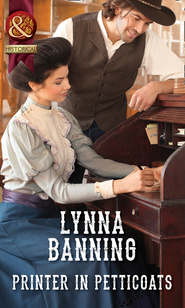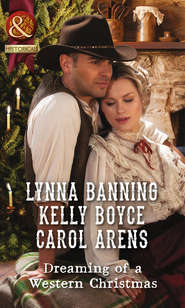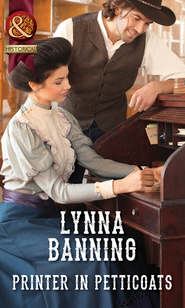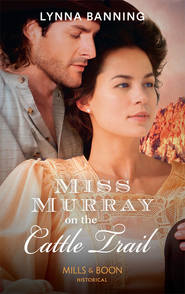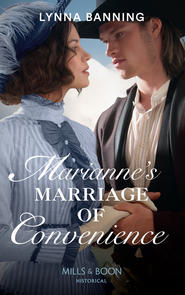По всем вопросам обращайтесь на: info@litportal.ru
(©) 2003-2025.
✖
The Law And Miss Hardisson
Настройки чтения
Размер шрифта
Высота строк
Поля
She slammed the desk drawer shut, yanked her black silk parasol from the china stand beside her desk and marched past him to the door.
He got there ahead of her.
“Stand aside, please,” she ordered. She looked up at him with fire in her eyes. He noted they were an odd shade of green, and the mass of dark chestnut hair piled on top of her head seemed too heavy for the slim neck. The rest of her was pure woman. Small waist, gently flaring hips, skin like peach silk. The soft green dress clung to her upper torso in a way that made his mouth go dry, and her large, expressive eyes, framed by definite eyebrows and thick, black lashes, looked fearless.
He folded his good arm over his sling, content to block her way. She smelled good. Sweet and clean, like soap. He inclined his head toward her to get another whiff.
And then he spied something over her shoulder. Something she had forgotten in her fury. It sat on a glass-fronted bookcase behind the desk, and he hadn’t seen it because he’d been focusing on those green eyes of hers.
Balls of fire, there couldn’t be more than one creation like that in the entire country!
And there it was, right smack in front of him. That straw hat with the shiny red cherries on top.
Chapter Two
The parasol opened with a swish. Beneath the arch of black silk a pair of flashing eyes held his. “Why are you staring at me like that?”
“You’re the lady on the stagecoach!” Clayton managed. “I recognize your hat.”
The green eyes widened. “My hat?”
“Ma’am, I was badly wounded. As I recall, you got some whiskey for me, and for that I am eternally grate—”
“Whiskey!” She studied his face, then inspected the sling on his arm. Her face changed. “Oh, yes, I remember now.”
“The doctor in Cedarville dug out the bullet and taped up my ribs. I’m obliged to you, Miss Hardisson.”
Her dark brows drew into a frown. “It was Brance Fortier who shot you! That’s why you want to find him, is it not? To settle the score?”
“Not exactly.” Clayton shifted his weight, leaned his aching back against the closed door of her office. “To tell you the truth, ma’am, I don’t know who shot me. Never saw him. Might’ve been Fortier. Might’ve been somebody else. Doesn’t much matter, since I’m takin’ Fortier back to Texas soon as I find him, to stand trial for murder.”
“I am sorry, Mr. Black. Brance Fortier is not going anywhere until he is tried for horse theft here in Clackamas County.”
She said it with such conviction Clayton gritted his teeth. Why, why was he saddled with this annoyingly stubborn lady? She sure didn’t act as soft as she looked, small and fragile in green-sprigged muslin puffs and ribbons. She acted like she knew something he didn’t, and it got under his skin. He needed to find out where Fortier had gone and get the hell out of this place! The town and everything in it—especially her—made him uneasy. All he wanted was Fortier and justice. Swift and efficient.
And Irene Hardisson knew which direction he was headed. He cleared his throat. “Miss Hardisson, I’m dead tired and hot and sweaty from near twenty hours in the saddle. If you don’t mind, we’ll continue this skirmish later.”
She sent him a look that would fry bacon. “Well, I never!” Hands propped on her hips, she stood toe-to-toe with him.
Clayton stifled a groan, then spun on his heel and headed for the door. “I need some answers. I’ll be back after supper.”
“I will not be in after supper,” she snapped. “I will be at my home.”
“Fine,” he shot back. “Where do you live?”
“I did not mean for you to call, Mr. Black. I am not receiving. I meant—”
“At the hotel, then. Later. I’ll probably pick up a poker game, see what I can find out.”
With a nod in her direction, he bolted through the doorway and was gone.
Openmouthed, Irene listened to his boots clump down the boardwalk. She most certainly would not see him later! Their business, such as it was, had been completed. She had absolutely no wish to see Clayton Black ever again.
On the stagecoach she had not paid that much attention to the injured man they had loaded aboard other than to supply some pain-deadening whiskey. He had looked every bit the lowlife. Now, the man might be dusty and rumpled, but with his tanned, even features and straight, dark hair, she noted he was extraordinarily handsome. She nudged the awareness to the back of her mind. A moment ago he had stood there, assessing her with those cold gray eyes, and she had felt…well, intimidated.
So what if he is a lawman? A Texas Ranger, or so he said. That did not mean he was a gentleman. “Gentlemen,” she announced to her pile of waiting papers, “do not intimidate ladies.”
She swept to the bookcase behind the desk and retrieved her straw hat. Decorated as it was with shiny red fruit, it had cost her four whole dollars at Whyte’s in Philadelphia. She’d bought it because it reminded her of her father; he had adored cherries.
“And a poker-playing lawman at that,” she muttered. “Papa always said that was the devil’s game. That’s why he taught me to play chess instead.”
She pulled the door closed behind her, locked it with the key she dug out of her reticule, and headed down Park Street to her cottage.
Her spirits drooped. Another restless night with nothing to occupy her mind but how lonely she felt, so far away from everything familiar to her—the solid brick house she’d grown up in, her father’s library of books, her father himself, dead these past four months.
On the surface, she maintained the cool, controlled manner that had been bred into her, but inside, when she was alone, she had to face her real feelings. Her soul ached at the loss of her father. She would never see his dear, bewhiskered face again.
Her shoulders sagged. She was two thousand miles from the cobblestone streets of Philadelphia, the comfortable, welcoming home she’d always known. She longed to be there now, longed to let Nora help her out of her stays and petticoats, draw her a bath, bring supper on a tray. For all the years she could remember, the plump housekeeper had loved her and taken care of her, just like a mother. Oh, why had she ever left?
Because it was not enough, a voice inside reminded. You wanted to make your own way, be a part of the new Western frontier.
Well, now she was part of it, God help her! She supposed men like Clayton Black went with the territory. Men who hunted other men. Men who intimidated women. Men who frequented smoke-filled rooms playing…poker.
It was only a game, wasn’t it? Why had Father been so against it?
She loved games, excelled at them. Loved the feeling of control she gained when she mastered the rules. She guessed her joy in such activity was an antidote to losing her mother when she was four, and the confusion that overwhelmed her later when her father began to fail.
She had studied law not only to uphold the name of the Hardisson law firm but because it offered her a kind of emotional security. She could not predict life or death, but with intelligence and knowledge of the rules, she could dictate the outcome of a trial. Or a game.
The thought pulled at her as she turned the corner across from the town square and sped toward the white frame house that was now hers. Inside was safety and warmth. Predictability. After her encounter with Clayton Black, she felt more than the usual need for such things.
“But at least I had the last word,” she announced to her empty front parlor. She halted in front of four rolls of rose-sprigged wallpaper she’d left leaning against the stepladder. “Or did I?”
She could not remember. When he had looked at her, under her corset her heart began to hammer like a piston and her thoughts flew up and away like so many dandelion puffs.
She smoothed her palm over the carved oak banister in the hall and stepped with exaggerated dignity onto the first stair. “I am becoming a notional old maid with a silly brain that goes into flutters over a Texas Ranger’s smile! Well, I will have none of that, thank you. None whatsoever!” She reached the top landing and marched to her bedroom door.
Inside, the golden afternoon light poured in the open window, bringing the scent of roses and Mrs. Gerstein’s honeysuckle vine from the neighboring yard. Irene shut her eyes. Papa is gone.
She opened her eyes and spoke aloud to the windowpane. “And he is never coming back.”
“Cut the cards, mister?”
Clayton reached out his good arm and split the deck. He’d played seven hands, won the pot after the last one, and now his mind wandered away from the game while the dealer slapped cards down onto the scarred oak table.
Sweat crawled down his back. He felt off balance. He’d unpinned the badge on his vest to forestall questions, had been invited to join the game with no inquiries. He wondered if the five men gathered around the table would be as friendly if they knew he was a Texas Ranger. If they knew he was after information, they might clam up.
He didn’t belong here. If they knew he was half Cherokee, he wouldn’t even be allowed in. The sign in the hotel lobby said No Indians. He longed to get up and leave, but it was too early to break up the game. He hadn’t learned a damn thing about Fortier so far. Maybe he was sitting at the wrong campfire.






